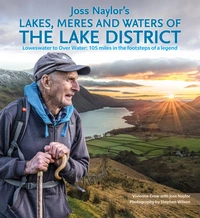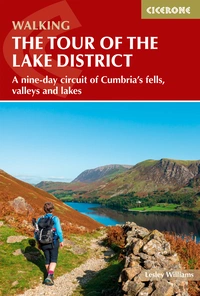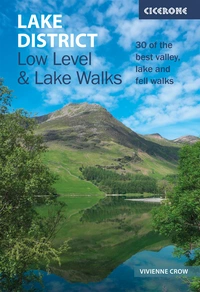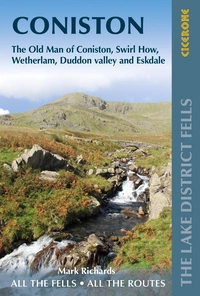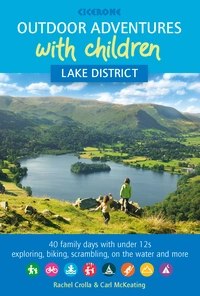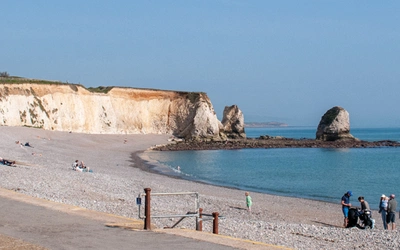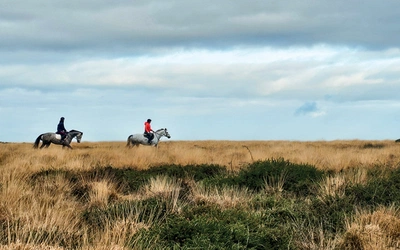A Lakeland Summer, by Elizabeth Battrick
Elizabeth Battrick, walker, writer and lover of the Lake District, wrote A Lakeland Summer, published by Cicerone Press, in 1979. Here, her son Peter Battrick gives a short introduction to her life, followed by an extract from the book.

Elizabeth Battrick 1922 – 2007
Elizabeth Battrick was born just outside Blackburn, Lancashire. She was educated in Yorkshire, but come the outbreak of the Second World War was in Canada, touring with an English Schoolgirls Cricket Team. After a short time at Toronto University she returned to England and joined the WRNS. Towards the end of the war she was serving in Algiers as a Petty Officer Writer, and it was here that she met her husband, John, who was serving in the RNVR. They married in 1944.
It wasn’t until 1975, though, after bringing up a daughter and two sons as well as a number of dogs, cats, hens and even a few geese, that she finally achieved her lifetime’s ambition by moving from Lancashire to live permanently in Cumbria. Initially based in Endmoor outside Kendal, she and John soon made their way into the Lake District proper, finding an old Westmorland farmhouse in the peaceful woodland of the Winster Valley.
There they walked, John occasionally worked and Elizabeth wrote. She wrote prodigiously, articles for the National Trust, for which she worked part-time, articles for newspapers, articles for Cumbria Magazine and The Dalesman. And a book, working title As Grandpa Used to Say, but which finally went to press entitled A Lakeland Summer.
After A Lakeland Summer, Elizabeth continued to write books, but they were the result more of scholarship than personal reminiscence. The Guardian of the Lakes, published by the Westmorland Gazette in 1987, was a highly respected history of the National Trust’s work in the Lake District, there was a pocket book of Lake District walks, and she was to become an acknowledged expert on the life of Beatrix Potter, particularly her work to help protect the landscape of the Lake District.
Elizabeth was asked to co-write the book accompanying the major exhibition, Beatrix Potter, the Artist and her World, held at the Tate Gallery in 1987/88, and more related publications followed. But here we will concentrate on A Lakeland Summer.
It was a simple story, as all the best stories are, of a young girl, Elizabeth herself in a very thin disguise, on a long family holiday in the Borrowdale Valley in 1935, and her introduction to the Lake District, its people, its landscape and its high hills. It is, in essence, the story of the start of Elizabeth’s love affair with the Lake District; a love that was to end over 70 years later in Hawkshead, to where she and John had moved shortly before his death in 1998.
As a keen walker and writer, it is not surprising that on occasion Elizabeth had come across Walt and Dorothy Unsworth. They travelled in the same Lake District circles. Walt, of course, had set up Cicerone Press in 1969, with Brian Evans, and it was at Cicerone, in 1979, that Elizabeth found a publisher for A Lakeland Summer. The story, covering just a short month of time in the Lakes, but containing many adventures, observations and insights, was enjoyed by all who read it, but it was not a great seller, a failure that Walt said had always surprised him. He’d thought it a delightful tale, beautifully told, from which everyone with a love of walking in the Lakes and for the Lake District itself would derive a great deal of pleasure.
The book is long out of print and only a few copies remain, most in the grateful hands of friends and family.

Here is a flavour from Chapter One, ‘The House in Borrowdale’, describing the extended family’s journey north to their spring holiday destination. At this time Elizabeth, the un-named narrator, was 12, her brother, born John but here portrayed by Robert, was just 10 and Grandpa, a kindly but overbearing patriarch, and the real star of the whole story, was a very sprightly 70.
‘We motored up to the Lakes from Lancashire in the Humber, an expeditionary force of interested parties. Aunt Meg drove, with Grandpa in front directing her in the manner of the Captain on the Bridge giving orders to the helmsman. “Pass that car,” he would say sharply when we came up against opposition to fast forward movement, quite regardless of blind corners or brows of hills. “Come on, now!” he would bark, leaning forward to give the car impetus and ignoring the vehicle coming from the opposite direction. Aunt Meg, normally the most easy going of women, took on that mulish look that meant she might stop in the middle of the road, or, worse, do what Grandpa told her. Grannie and mother, by now on the very edge of the back seat, grasped the safety straps with white knuckles, wedging Robert and I between them. Fortunately the damson blossom in the Lyth Valley provided a diversion.
“There, Mother,” Grandpa said, waving a nonchalant hand at the white drifts of lacy bloom as though it was all his own work, “just managed it for you before it went over.” He dearly loved all the country sights and sounds, but would never admit it, always laying them before Grannie with the tolerant air of pandering to her female tastes. His daughters had caught the habit, too, so Grannie was constantly being urged to crane her neck at what, for someone who invariably was put in the back of the car, were difficult angles.
Windermere next, with the wide lake and the hills beyond and the swans floating past, but Grandpa would have none of it, turning in his seat and glaring at our excitement. This was, he gave us to understand, a mere overture to the glories yet to be. Rydal and Grasmere gained his restrained approval and he hailed the Lion and the Lamb rock on the top of Helm Crag, which becomes an organ grinder from the other side, with the approval of a commander for an alert sentry. The top of the long haul up Dunmail Raise brought us to the grave of King Dunmail, stone-cairned in the face of time, and the Cumberland border, the gate to the land of dreams.
“Now,” said Grandpa, “we’re getting somewhere.”
What we got next was our lunch. Aunt Meg said she felt faint and refused to drive further without food. We picnicked on the narrow road on the west side of Thirlmere, below Harrop Tarn where the path starts over to Watendlath via Blea Tarn.
“Good walk, that,” said Grandpa, supervising the spreading of the picnic rug, white fur on one side, and strong green serge on the other, “you must do it.”
On into St. John’s Vale, over the hill and the dramatic drop into Keswick, along the lovely line of the lake and at last we arrived in Grange, all among the spring green of the birches. Grannie was told to admire the view and the two girls detailed off to inspect the village and find the most comfortable boarding house.
That left Grandpa, with Robert and I, free to lean against the parapet of the double bridge and look into the waters of the river that swirled in green, trout-shot pools round the stone uprights. For the first time I smelt the exciting smell of wood smoke, sheep, pine trees and cold water and felt the almost physical presence of the hills, withdrawn and sometimes antagonistic, but challenging always.
“What about tea?” asked Rob, anxiously. He had an awesome appetite.
Grandpa ignored him and pushed his tweed cap comfortably on the back of his head the better to name the surrounding hills.
“That’s Maiden Moor,” he pointed above the village, hailing the whale-backed, heather-blackened height as an old protagonist, “and there,” he was looking further along towards the lake where the mountain silhouette became a camel’s hump, “is Cat Bells.” He lingered on this for a moment, Cat Bells coming under his benign approval, then turned to the top of Derwentwater, looking under his eyebrows at the triple peaked mountain majestically dominating the end of the valley. “And that’s Skiddaw. Dullest hill to climb I’ve ever met. Don’t bother with it.”
Then he turned us round to face the conical hill set in the narrow mouth of the Rosthwaite valley. “That’s the Tooth of Borrowdale,” he said. “Makes a good run before breakfast to give you an appetite.”
“I don’t need any runs to give me an appetite,” muttered Rob.
Mother and Aunt Meg, distraught with the difficulties of interviewing landladies, mother’s hairpins falling like discarded hopes, finally found us the house. An uncompromising Victorian villa in Grange kept by two sisters called Floss and Daisy. They had agreed, if we suited, to take us for a month at ten shillings a head a day, and we must have suited because they went on taking us for a month every year until the second world war took our elders by surprise and confirmed the excited forebodings of the younger generation.’
Extract taken from A Lakeland Summer
Copyright Elizabeth Battrick 1979

